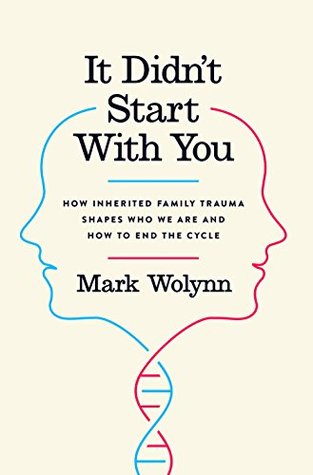More on this book
Community
Kindle Notes & Highlights
by
Mark Wolynn
Started reading
October 13, 2025
As with many stories of healing and transformation, what started out looking like adversity was actually grace in disguise.
A well-documented feature of trauma, one familiar to many, is our inability to articulate what happens to us.
you and I are three times more likely to experience symptoms of PTSD if one of our parents had PTSD, and as a result, we’re likely to suffer from depression or anxiety.[4] She believes that this type of generational PTSD is inherited rather than occurring from our being exposed to our parents’ stories of their ordeals.[5]
What I’ve seen demonstrated time and time again is this. Symptoms often mimic or recreate some facet of a trauma that we, or our parents or grandparents, found intolerable. So intolerable, in fact, the event is rarely discussed.
Yet, when we’re willing to explore these traumas, we can end the cycle of suffering and mitigate their effects on our children.
When your grandmother was five months pregnant with your mother, the precursor cell of the egg you developed from was already present in your mother’s ovaries.
before your mother was even born, your mother, your grandmother, and the earliest traces of you were all in the same body—three generations sharing the same biological environment.[1]
Because your father’s sperm continues to develop throughout adolescence and adulthood, his sperm continues to be susceptible to traumatic imprints almost up until the point when you are conceived.[4]
our DNA can be affected by both negative and positive thoughts, beliefs, and emotions.
A 2018 study from Tufts University found that men who suffered trauma as children were able to pass anxiety to their children through their sperm. This particular study focused on sperm donors who reported having significant adverse childhood experiences (ACEs).
Interestingly, this particular research also showed that a father’s sperm was more likely to affect his female child.[59]
Uncannily, the Bible appears to corroborate the claims of modern science. Specifically, the New Living Translation states: “[God] does not excuse the guilty. He lays the sins of the parents [or iniquities or consequences—depending on which translation you read] upon their children; the entire family is affected—even children in the third and fourth generations.”[61]
That would be like fathers going off to war and coming back numb from the trauma, and their daughters expressing their fathers’ fight, flight, and freeze responses—his shaking, his terror, his shutdown.
In the male line, she has observed that some symptoms—such as depressive and antisocial behaviors—can extend out for three generations, and other symptoms—such as risk-taking behaviors—can extend out for five generations.
“Environmental enrichment,” Mansuy says, “at the right time could eventually help correct some of the alterations which are induced by trauma.”[28]
“From the moment of conception, the experience in the womb shapes the brain and lays the groundwork for personality, emotional temperament, and the power of higher thought.”[1] Like a blueprint, these patterns are transmitted more than learned.
Studies show that children who are exposed to unsafe and unpredictable caregiving—between birth and twenty-four months—can experience lasting and severe behavioral and neurodevelopmental effects.
Let that sink in for a moment. In your earliest years, you’re creating a template for whether you feel safe and secure in life or whether you feel you need to defend against it.
The impact of an early break in the mother-child bond—an extended hospital stay, an ill-timed vacation, a long-term separation—can be devastating for the infant.
“When they are parted, the infant does not just miss its mother. It experiences a physical and psychological withdrawal…not unlike the plight of a heroin addict who goes cold turkey.”[2] This analogy helps to explain why all newborn mammals, including humans, protest with such vigor when they’re separated from their mothers. From an infant’s perspective, a separation from the mother can be felt as “life threatening,”


